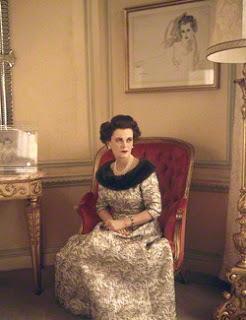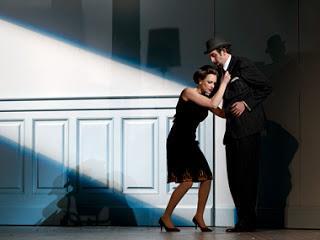Margaret Campbell, Duchess of Argyll
Photo courtesy of National Portrait Gallery
Poet Philip Larkin
famously identified 1963 as the year sex was discovered, "between the end of the Chatterley ban / and the Beatles' first LP." In that same year, the sensational divorce trial of the Duke and Duchess of Argyll drew to a close. The judgment against the duchess took three hours to read; though the duke did not escape a moralizing reproach, it was the "perverse and insatiable" sexuality of the duchess which was the primary object of the bench's censure, and the tabloid press's speculation. This was not the only public narrative of the duchess' private lives, however, and in "Powder Her Face," Thomas Adès created an opera traveling from the 1990s hotel room where the duchess resided, to the period of her interwar celebrity as debutante and divorcee, through the trial to her tenure as a society hostess in the 1970s and beyond, before returning to the Grosvenor Hotel. The drama is shaped in vignettes of hallucinatory vividness, as the duchess controls and is controlled by the narratives of her life. The libretto, by Philip Henscher, is smart and multilayered and sensitive to the diction of the different decades in which the drama unfolds. The score, insinuating, sympathizing, and satirizing by turns, is creative and allusive. Jonathan Stockhammer, conducting the current run at NYCO, brought out its nuances ably. Operatic conventions are used judiciously, to underline the hypocrisy of a judge or the Zerbinetta-like qualities of a maid. There is a sinister symmetry between scenes where the duke and duchess sexually exploit their staff. There is a Porter-esque ballad sung by a Lounge Lizard recognizable from Wodehousian satire. There are too many Richard Strauss references to count, including a sly Salome allusion when the Duchess enters the courtroom, there as elsewhere the cynosure of all eyes. There are tango and foxtrot rhythms and the instrumental textures are used effectively to indicate the tension between a brittle social veneer and the turmoil caused by double talk and double standards. There is laughter in the score and there is silent, stricken despair. It is frequently, exultantly obscene. Adès and Henscher resist turning the characters into archetypes, and the opera openly acknowledges the ambiguity of its own position as a narrative about (among other things) private lives made public. Often comic and ultimately tragic, as a smart, sophisticated commentary on sordid social themes, I think it's remarkably successful.
Jay Scheib's production deliberately pushes motifs of the drama--voyeurism, exploitation, and discrimination--to their extreme. Scheib has scenes of sexual violence bookend the opera, suggesting that the duchess' attempts at sexual independence would be viewed as always doomed. The appearance of the Duchess' lovers on stage could have been tragically grotesque, but was greeted by audience with laughter, and frankly, the gradual emergence of the men from their various places of concealment had more of the Marx Brothers than Macbeth about it. It could have been claustrophobic or celebratory; but I felt it was neither. Still, the production was often interesting, if less nuanced than the opera itself. Overlapping scenes with dissolving walls or misplaced elements mirrored the disorder of the duchess' memories. The conflation of figures (called for in the libretto) was effective especially in case of the hotel manager/duke/judge. The nature of his apparition in his last scene called to mind Mephistopheles, and the words he is given could belong to Death himself. The production's oppressive use of video accused the audience of unequivocal complicity in treating the Duchess as scandal; an exaggerated effect, but better than complacency. One of my reservations about the production was that it seemed less ready than the opera to acknowledge fearlessly the many forms of female sexual desire. And it is the Duchess' desires that are the unforgivably scandalous fact brought before the court of law in Act II (in this production, a man performs oral sex on the judge as he gives sentence.) What I, listening to
the recording, had recognized as (or assumed to be) the maid's approach to sexual climax was converted by the production into childish jumping on a bed. As for the Duchess, her emotional starvation and insecurity were emphasized, I thought, to the detriment of the complex, tragic, flawed figure created by score and libretto.
The work of the singers as an ensemble was one of the evening's great strengths. Coupled with the energy of the orchestra, the chemistry among the members of the small cast made the performance tense and involving. Matt Boehler sang with supple phrasing and suave, sinister presence, bringing out the individuality in his personae without losing their sense of collective menace. Tenor
William Ferguson proved ably protean as the Electrician and Lounge Lizard. The vocal demands of the Maid are strenuous, and
Nili Riemer handled the coloratura (and the diction) impressively. I didn't get much of a sense of the character's individuality, but that might be a directorial choice. As the Duchess, Allison Cook was nothing less than superb. A compelling presence at all times, she handled the vocal and dramatic demands of the role stylishly and with apparent fearlessness. Again and again I was impressed by the timing of her gestures and utterances, the nuance which she brought to the expression of an elaborately constructed personality. Cook managed to be at once pitiable and commanding as she negotiated a path through her own history, until the last of her delusions was stripped, leaving her with only bitter truths about society and herself. It's not a pretty picture.



